Benda Bilili! is in some ways very Hollywood – the story of a dream of stardom which comes true despite incredible odds. On the other hand, the subject matter of a group of homeless paraplegic musicians in a band called Staff Benda Bilili (which means something like “looking beyond appearances”) in one of the most dangerous cities in the world – Kinshasa – is hardly Tinsel Town. As the film-makers relate below, they themselves were also “nobodies” when they started filming, in the sense that they had no experience of film-making and little money.
Their friendship with the band was sealed by some extraordinary moments – such as when they were thrown in jail only for the band to rescue them. In this in-depth conversation Renaud Barret and Florent de la Tullaye recount the highs and lows of their incredible adventures in Kinshasa, Democratic Republic of Congo, during the making of Benda Bilili! The film has already had rave reviews, is genuinely inspiring, and opens in UK cinemas next Friday.
Watch the trailer to Benda Bilili!
RENAUD BARRET: I had this journalist girlfriend, a big reporter, and at the time I was severely bored with life in general. I was a graphic designer and photographer but I wanted to do other things and so she said, “Listen, I’m going to east of the Congo to cover the demobilisation camps for child soldiers. Why don’t you come?” That was in 2003. And I was lucky, during the 10 days we spent in Kinshasa, to meet a musician, a guy called John Jamming. We started to go out and walk around town a bit. The name Kinshasa evoked plenty of things for me. It was the Muhammad Ali fight. It was the capital of African music. It was a word that cracked like the lash of whip. There was all this kind of imagery of the very heart of Africa. Pagan Africa.
FLORENT DE LA TULLAYE: I was a photojournalist. I’d taken up photography at the age of 15 and I had been Marc Riboud’s assistant. I admired the great photographers of the Magnum school. In 2003, I had won a scholarship from this organisation called the Villa Medici "Hors Les Murs" who organised residencies in Sao Paolo, New York and Moscow. I was at the Moscow one and there was this whole saga surrounding a project that was very important to me and which I had been forced to abandon because of the Russian mafia. I sent an email to Renaud to tell him a bit about my problems and adventures. That’s when he answered me by mail saying, “Listen, I’m in Kinshasa. You absolutely have to come. You’ll love it.” That was it.
RB: I knew Africa quite well. I’d travelled a hell of a lot, and I’d visited quite a few countries, in tourist mode. Kinshasa had nothing to do with what I had seen, or perceived of Africa until then. There was music everywhere, and that music wasn’t only by Koffi Olomide and his ilk. It really was ghetto music. The place totally bowled me over, so I called Florent, who was a very old friend.
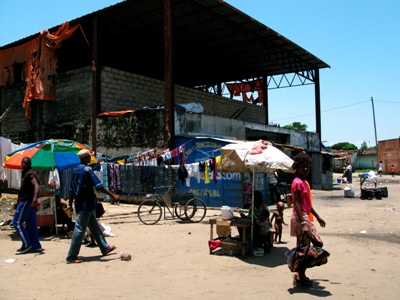 FdlT: So Renaud pitched this film project to me, about the INA, the National Institute of Performing Arts.
FdlT: So Renaud pitched this film project to me, about the INA, the National Institute of Performing Arts.
RB: I found myself there one day and all the clichés you could wish for were there too. There were holes in the wall, there were double basses with only one string, and everybody was trying to study with this kind of feeling of rage, there was nothing. I thought it was really perfect. It summed the situation pretty well. So I said to Florent, “Listen, we don’t give a shit. We have no producer or production company, we have nothing. We’ll put our own money into it. I had a bit of money from my graphic design work."
FdlT: I was completely in debt, ha ha.
RB: And so we said, "OK. We’re going to buy a camera and just go for it."
RB: We went straight into the ghetto, found a hotel with rooms at $10 a night in Baroumbou, the hoodlum’s neighbourhood, and we started to do some mad stuff. What we did then, I’d never do it again now. That’s to say, we went into houses, camera at the ready. We never gave anybody any money. We were completely nuts. And we began to meet musicians and film them, and to film these little gigs.
FdlT: As we went along, we realised that it was a lot more interesting to meet musicians in the ghetto than in the INA. We spent about a month and a half on that first trip, and the first musician with whom we really started working in a serious way was Jupiter.
RB: We began to understand that the city is a cauldron of all the 400 ethnicities of the Congo, with their rhythms and all that. And yet there’s a style which is common to everyone, this kind of melancholy in the voices, in the melodies, this kind of DIY approach to making instruments, using rubbish and scraps, which is due to the poverty but which also creates a certain sound. It’s almost as if the city has this DIY recycling soul. We were totally into that whole thing. So we meet Jupiter, towards the end of that first stay of a month in 2004, in the final week.
FdlT: And in the meantime we met Staff Benda Bilili. We were coming out of a bar one night, somewhere in the city centre. We were a bit… you know…
RB: We’d been filming all day. We would spend all our days filming. We were a bit done in, smashed. And we heard this tune. “What’s that??!” And we turn up, and there they are in front of the SONAS roundabout, rehearsing. We arrived, slightly on tiptoe, we put our cameras away in our bags, we sat down and just listened...
Staff Benda Bilili perform "Polio"
FdlT: ...A little intimidated, I’d say, by the whole entourage that was there: down-and-out soldiers, street kids, girls and then the handicapped guys. It was quite an atmosphere.
RB: What was really strange was that they already knew who we were. Like everyone in town, they knew that there were these two daft white people who were filming in the ghetto, looking for musicians. So they saw us with our two cameras and pretended not to know anything whereas they knew everything about us already. And there you have it. We were the ones, simply because we were the first to take an interest in them. That’s all. If we had been a bunch of Japs from NHK, they would have done exactly the same.
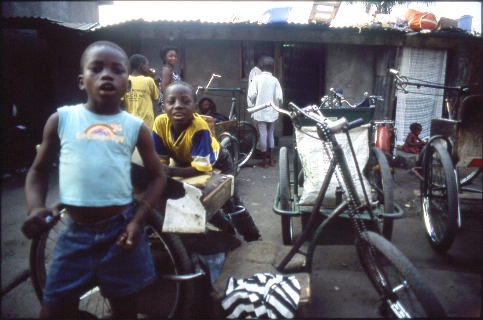
FdlT: What was special about Staff was that they had their own songs. At that very first meeting we realised that this wasn’t just another group out busking for pennies and playing covers of well-known songs. They were doing their own thing. Then something happened which was to really cement our friendship and bring us much closer on a mutual footing. We spent a part of the next day filming them. We didn’t know Kinshasa very well at that point, and we were just having fun filming from Coco’s mobilette, sitting in the back, and at one moment we pass right in front of the ANR, the Agence Nationale des Renseignements; the local FBI. And there, on the square, we soon realise that all the shopkeepers and traders are in fact plainclothes police. And so, inevitably, we’re arrested. This guy in shades takes our letter of authorisation to film and holds it upside-down, pretending to read it.
RB: It freaks us because at that time we didn’t quite understand the local humour. These guys turn up with a man they call "The Gorilla", this giant with slavering lips and injected eyes. We were there going, “Jeez! Holy shit!” We didn’t understand a word he was saying, and we ended up in prison. And from the cell, which overlooked the street, we began to see the Benda Bilili gathering on the opposite pavement. It started with three or four of them; Ricky, Coco, Theo etc, and then slowly others started to join them. They grow to 20, then 30, and then Coco kickstarts his motorbike, revs up and rams the gates of the police station!
RB: Everybody was shouting: “Free our whiteys! Free our whiteys! They’re our beefsteak! They’re our meal ticket! Free the whites otherwise you’re all going to have problems!” There’s this expression in Kin which goes "Toye bin operation, Toye bin lakou!" It means: “Operation, we know your place, we know where you live.” They also call it Stylo Rouge, the "Red Pen" Correction! So the major at the station, who was a little bit sharper than the others, started to get a bit scared, because no one messes around with the handicapped in Kinshasa. He freed us and we ended up getting hammered with the Staff Benda Bilili. And we were saying to each other, “Check these guys out! They assault the police station to free us, and they freed us!” Some crazy shit! And so we got pissed with them just to celebrate it all and that’s how our relationship started.
FdlT: They felt there was something different about us, because they beg on the streets, and there are whites who give them money, who might even buy them a guitar from time to time, but nothing more, and in our case, I don’t know, I think we had a way of looking and talking to them that they liked. We didn’t propose to make a music recording with them straightaway. And if you like, just the fact that they let us film their world was important in that it showed us that handicapped people can do almost anything. And afterwards it was even they a bit who decided, “Hey we’ll go a film this, we’ll go and film that…” A couple of days later Ricky (pictured below with Theo and Roger) was introducing us as “Here are our producers…” But like all musicians, you know, like everyone who’s a bit lost in life does if they have a whitey to hand. And so, as it happened, their status on the streets grew because of us. There were plenty of interconnected issues.
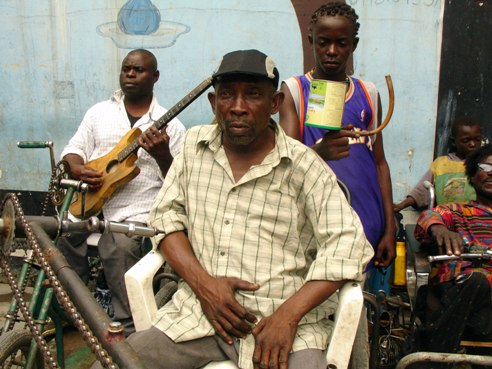
People are needy out there as well for another reason, which is that people have no trust in each other. They’re always ripping each other off. And totally bizarrely they think the white man is honest, despite all the tragic history between the whites and the blacks in that part of the world. So whites are really in demand, as it were.
RB: There are times when you arrive in a city like a crazy person, you know, like a punk with his fingers in the air, and everything is possible. You can drown in that narcissism, but it never happened to us. People were calling us producers and all that stuff but we knew very well who we really were and that at home our lives were in a total mess. In a way, we were completely unconscious of what we were trying to do but the desire to do it meant that we just went ahead with it, saying “Fuck it!” you know. It was almost the let's-go-straight-into-a-wall option, but we went anyway. We were acting only with our hearts, not with our heads. There’s this role that you endorse but you have to keep it in proportion There were moments when you had to say, “Hey, guys, we don’t have a magic wand, you know. All we’re doing is trying something together.” We tried to be honest. And it’s true that at the time when we arrived, we idealised plenty of things. As time passed, we became aware of the horror of that city.
FdlT: Well, as Mark Twain said, “They didn’t know it was impossible, so they did it.”
RB: On that first trip we were just filming as much as possible. We were living in the ghetto. We didn’t see another white face for months. But by choice, by desire, by the cultural romanticism of all the people you’ve admired in your short life, people who you’ve read, whose artistic approach you’ve appreciated…
FdlT: The exchequer as well… What you have in your pockets. That put us there too.
RB: Let’s say that we knew that the money we had was destined for this project. There was no question of talking about salaries or anything like that, but at the same when you work with people like that you’re involved in welfare in some kind of way. Suddenly, everything hits you in the face. You’re not just filming a normal film. Every day there are problems to solve. If you put yourself in the midst of people’s lives, you have to play that role as well. Try to explain that to an accountant afterwards, try to explain all you’ve blown on baksheesh, on bottles of whisky, on repairing tyres, you know. We were in another world and in fact that world suited us too, in the sense that, back in France, at the stage of my life, I understood nothing. That country was just screwing my head up. All those people crying into their cups were doing me in. All those people who needed support from the state just to create something were doing me in. In Kinshasa, it was the complete opposite. It was people who create out of a sense of urgency, who create because it keeps them alive, and suddenly you identify yourself with that, at your own minuscule level. You say to yourself, “That’s it! That’s it. That’s the truth. That’s where it is. It’s not in the calculation. It’s in the act of creation first and foremost.”
Staff Benda Bilili perform "Na Lingui Yo"
FdlT: And in the dream. But we went home after that first visit and went to see plenty of record companies etc. No one was interested. Everyone took the piss out of us. I showed a friend some videos of Jupiter. He was a jazz fan and all that, and he said, “Hey, that guy there, you’re right. You have to record him.” So we went back in July 2004 to record Jupiter. And at the end of that session in the studio we had some time left and we said, “Well, Ok let’s bring Staff in.” It was like a test.
It was pretty good, but not good enough. I have to go back a bit. Back in March 2004, you had Staff Benda Bilili in one part of the city, you had Jupiter in another part of the city, and in the middle of it all, in another neighbourhood, we came across Roger, but in a completely furtive way. In fact, we were on our way to the rehearsal of the music group, les Jahfros. It was taking place in a kind of parish church, in a courtyard, and this little kid walked by with his strange instrument. We thought he was about eight years old but in fact he was a bit older. He was this kind of apparition, who started playing in front of the camera.
RB: At the time we were neither filmmakers nor record producers. We were absolutely nothing, in fact. We just had a few cameras - a few cameras and an ear. Perhaps an eye too. But at the time, especially an ear. So Roger walked passed us. He played about 10 minutes of satongé for us. Then we did an interview. "Hello. What’s your name? We have to meet again." You know, I recently found all the notebooks we were using at the time, those little Chinese notebooks which we bought, with all our rendezvous and all the info, day by day. We imposed this schedule on ourselves. It’s so curious to read all the notes we wrote in those little books; such-and-such is doing this, that and the other, we meet, we find it disappointing/brilliant, all that stuff. Who was it that was asking us to do all that? No one. It was our own sense of urgency, or desire, and that city created that urgency in us. We have 2,500 hours of rushes on the city, and they have enormous meaning today.
RB: After that first meeting with Roger, he disappears, as people do out there. Now we’ve understood why he disappeared, because he was living with his mother at 30 kilometres from the city centre, you know. He had to take the train to go home. And for a whole year… no news!
FdlT: We filmed the majority of Jupiter’s Dance in 2005. That’s to say, we carried on meeting plenty of musicians, even during the recording sessions, at night etc.
RB: We carried on carrying on. And still not a bit of interest back home in what we were doing. But it has to be said that we were, you know, a pair of tossers, who hadn’t been to film school, who didn’t really know how to hold a camera, and who had nothing much to their name except the energy to say that it was wonderful out there. I can understand that they said, “Ok, guys, thanks but no thanks.”
FdlT: Our main battleground was in France, in Paris. We even went to see Wagram, who now own the licence for the Staff Benda Bilili CD in France. I had to remind them of that the other day. I said, “Well, you know, we did come and see you way back then.” Ha ha ha. But we went and knocked on the door of the same guy who had paid for Jupiter’s recordings, who we’d never been able to pay back. He was in finance and this was his little side project. He gave us €7,000 to go and record Staff Benda Bilili.
RB: That recording happened in 2005, in the studio that you see in the film.
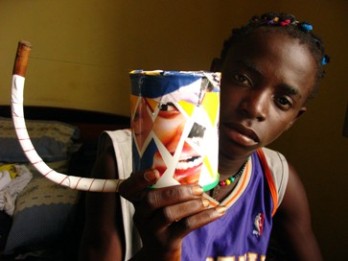 FdlT: And 15 days before we were taking the band into the studio - paff ! - Roger (pictured left) reappears. By chance! And that’s how he became part of the band.
FdlT: And 15 days before we were taking the band into the studio - paff ! - Roger (pictured left) reappears. By chance! And that’s how he became part of the band.
RB: I showed Ricky the footage I had shot of Roger when we had met him the evening before, of Roger dancing with the girl, and Ricky said, “What on earth is that instrument? Bring me that little fella! Bring him to me.”
RB: The business side was simple, at least it was in 2005. Things are clear-cut. They trusted us and you know why they trusted us? Because we came back three times, four times. And we’d always go back to see the same people. We weren’t like those little journalists who come along saying, “Yeah, man. Yo! Your music’s cool, the world is yours, we’re gonna get you shown on RTBF, and all that.” And then it’s "See you later, alligator." The difference between the journalists and us is that afterwards, in effect, we walk around the streets with them and they say, “Yeah! Big journalists… big producers!” And all that, because they mix everything up. But we’re not sodding journalists. We’re totally subjective. Staff saw us once time in 2004, they saw us come back a second time again in 2004 to reconfirm that we’re sticking with the project. 2005 the same thing. 2006 the same thing. That’s where the trust exists. There are highs and lows, but they really did understand that we were working for them, all of them.
RB: Jump to 2006. That was when we went into the studio, the first studio in the film, and we spent seven whole months in Kinshasa. Fuck the rest! You know. We were so touched by all the people around us. Everything was becoming mixed up: Jupiter, the Benda Bilili, all the other musicians. We filmed them, we began to edit their footage together, we began to put stuff up on YouTube, we began realise that people are curious and interested. The spiel of the record companies was “What? African music? No, never. That ain’t never going to work.” And then you put a clip on YouTube and you get 300,000 hits. What they were telling wasn’t true. And in any case, we were arriving in the midst of a total crisis for the record companies. A catastrophe. You realise that giving your little bits and pieces to a label is almost like putting all you possess into a boat that’s in the process of sinking. Those A&R people are telling you what works and what doesn’t work whereas they themselves are going down, losing millions every day because they have no idea any more of how things work and how to catch up with reality. They were like the Titanic.
Staff Benda Bilili: "Marguerite"
RB: And we also realised the absurdity of the system. There we were, working with musicians who were in a situation of emergency in terms of their sanitary conditions, of life in general, and then we were talking to people at the major labels, who have I don’t know how many thousands of employees, with how many thousands of pensions. And you say to yourself, “Where’s the music in all of that? All they’re talking about is profitability.” And it’s because even they are no longer on top of the game, you know. They’re no longer in tune with what’s happening. And when you’re working with musicians from countries like the DRC [Democratic Republic of Congo], you can’t be dealing with pay slips and invoices and certificates of this and that and all that stuff, like in France. No, no, you give each of the guys 500, because that’s it, you give them 500, and if you have to justify the payment, you just cook up a false invoice. There’s no Society of Musicians in the Congo or if there is it’s some guy who runs it, grabs all the money and scarpers. That’s what happens.
FdlT: After filming Staff Benda Bilili and others, we had loads of rushes, plenty of material, and we had this friend who came along and who knew how to edit films. And so he began editing all that and after a while we said, “OK, listen, why don’t we do a film?”
RB: Night and day, during the three or four months we spent in France, that’s all we did; edit, edit, edit, edit material. Just to create something so that someone with some cash just might come along and say “Jeez, fantastic. I’ll slap 10,000, even 15,000 euros on the table and we’ll see.” Well, it didn’t happen like that. At the time we were still working on other stuff. Florent was taking photos and all that. But we couldn’t do it any longer. We couldn’t work any longer. I couldn’t spend a month at an agency doing logos. The treatment of the pictures, you know, the pre-edit, edit, validation, it all takes so much time. Fuck you! You know. This is what we’re doing. That’s when our standard of living began to nosedive drastically.
FdlT: But there’s something else that happened in 2005. We finished the first cut of Jupiter’s Dance and we were invited to a Festival in Montreal called Rencontres Internationales du Documentaire.
RB: With a film captured with mini-camcorders, edited gonzo, you know, 100 percent gonzo!
FdlT: Well, not to dwell on that too much, but even a film filmed on these little cameras doesn’t look too bad on a big screen.
RB: Yeah, that was cool.
FdlT: And what’s more we saw plenty of other documentaries by people a bit like us, that’s to say, who worked alone in their own corner, on difficult subjects, without any money. It really gave us a second wind. It was strange because we were in a super-luxe hotel, and we didn’t even have enough money to go to the takeaway on the other side of the street.
RB: To buy a packet of chips with vinegar.
FdlT: At breakfast we stocked up on food and stashed it away in our pockets. We spent our days in screenings looking at other documentaries, and as we had a project that we had been thinking of but hadn’t yet formally embarked on, it was then that we said, “Shit... the Female Boxer Project, it could be a goer.”
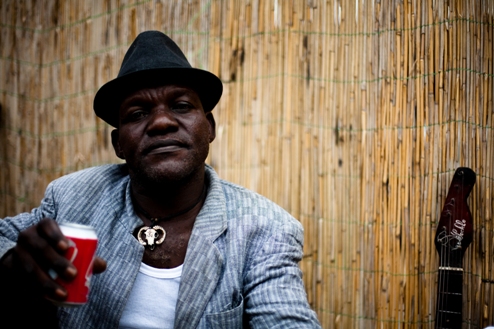 RB: We already had the material for the film because all day long, during those first two years, from morning until the next morning, we filmed. We hardly ever slept because you can’t sleep in a city like that. You just stick some matches between the eyelids.
RB: We already had the material for the film because all day long, during those first two years, from morning until the next morning, we filmed. We hardly ever slept because you can’t sleep in a city like that. You just stick some matches between the eyelids.
FdlT: Intimacy, and no voice-off commentary was a good way of looking at Africa because who were we to narrate the lives of Africans? We’re a new generation. We don’t have any colonies and we haven’t got any complexes linked to all that. That’s our past, but we’re not in it now. Even less so, in the case of an ex-Belgian colony. So who can gives us permission to comment, to talk about life in Africa? It’s just the fact that we had captured these scenes with those people that enabled their story to be told. It’s only through that.
FdlT: There are certain sequences in the film, like when the news breaks about the fire at the centre for handicapped in Bandal, that seem manipulated and "staged". The reality of the fire is that Renaud was in the studio. We learned that there had been this terrible event at the centre. So Renaud leaves for Bandal to see what was happening, meets Ricky’s wife, and gives his own telephone to Ricky’s wife, because they didn’t have a phone there, and they call Ricky to explain. That’s why you have this impression that the narrative in the film is almost too good.
RB: Take another example, the opening sequence of the film, when you hear this boy saying that he’s going to rob us and steal all our equipment - that happened in 2004. When we filmed it, we didn’t understand a word the boy was saying. That snippet stayed in the box for months and months and months, even years. Imagine, it was our first month in Kinshasa and there was this guy already saying, “Shit, I’m gonna shake you down.” But we only understood what he had said months, even years later. The scene fitted in well with where we were at then, at the beginning, in relation to our surroundings. We didn’t know what was going on around us. We understood strictly nothing. That’s a bit why we wanted to put that sequence at the beginning of the film. That guy hits the nail on the head in terms of how much we conformed to the cliché of the daft whiteys with plenty of good intentions out there.
RB: The same thing can be said about the sequence in the zoo when the young kids talk about God and Europe and all that! No fabrication! It was filmed after the recordings with Vincent, at about the same time that we were learning how to speak Lingala. I’ll explain how we did it. To begin with, they were used to us. I was there trying to film the rehearsal and we saw those kids with a booklet from the Jehovah’s Witnesses, and they were just talking about it amongst themselves. I said to myself, “Shit, this is brilliant,” and I gave them a radio mic, and said, “See you later.” I didn’t understand a word of what they were saying. I stood about 20 or 30 metres away from them, with a zoom lens. We knew we were getting something good, but there was no trickery involved.
Same thing in 2009, in the sequence when the new album is heard on the radio. On that day we were filming at the zoo, filming the whole shebang, and those two kids, Ricky’s boy and the other one, begin to start saying, “Yeah, well, what is Europe?” and all that. At that point we spoke Lingala perfectly, to a point where nothing escaped us any more. I heard the kid talking to his mate and in a flash I put a radio mic on him. But I never said, “This is what you’re going to talk about.”
FdlT: No one would artificially put “God created Europe to provide a comparison with life here where we live” in the mouth of a little kid.
RB: And the fact that we submerged ourselves in Kinshasa for so many years also meant that we were less likely to miss things like that...
FdlT: But it’s lucky that those little miraculous scenes happen. You also end up filming a hell of a lot, because you feel there might be something about to happen. Often, in the end, nothing does happen, but from time to time they do come. That’s to say, you have to be slightly awake, on your toes, vigilant, and from time to time a potentially brilliant sequence actually starts far from the main action. It’s not yet a scene, and it’ll only become something interesting much later. That’s why you have to film a lot. And very often you also miss some wonderful opportunities.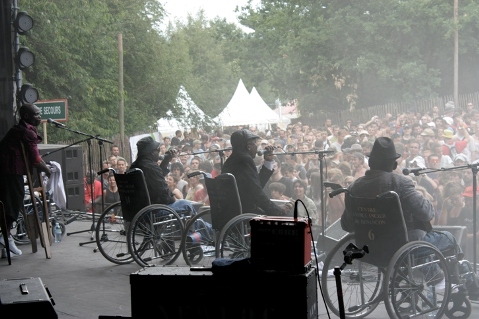
FdlT: It’s true that we’re attracted to people living on the margin, especially people on the margin who are also dreamers, you know…
RB: Because we’re also marginals who dream.
FdlT: The characters in Benda Bilili are people living on the margins who dream.
RB: Jupiter is a marginal who dreams. The female boxers are marginals who dream. Pygmies who want to go back home are also marginals who dream. We’re marginals who dream. And forget misery too. What is misery? Let’s define misery. I’ve never seen Staff Benda Bilili as miserable people. Never for one second. And perhaps what you get from the film as well is our love for them.
FdlT: I think we’re a generation who has grown up after colonialism. And well, often you get the impression, with the soixante-huitards for example, the rebels who threw stones at the government in Paris in 1968, that they carry a bit of guilt. We, at least I, have no impression of carrying guilt like that around.
RB: I’m guilty of nothing. I don’t give a shit.
FdlT: And the more we interacted with people, the more we realised what was really going on. We said that we idealised things out there a bit at the beginning, but very rapidly we learned that you cannot idealise social relationships in the Congo, you can’t idealise families, you can’t idealise all that.
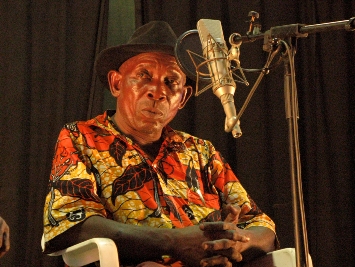 RB: All that wisdom beneath the mango tree stuff. It’s all nonsense. I think that Florent and I have a right to speak out, just like any African who’s been in France for five years. An African, a Congolese or whatever who has been living in France and has become naturalised, in effect he’s a Frenchman. So, how come I can’t express myself in the same way about the Congo? You know what I mean. What’s the problem? Because I eat like you, I shit like you. It’s not about handing out derogatory judgments. It’s about human judgments.
RB: All that wisdom beneath the mango tree stuff. It’s all nonsense. I think that Florent and I have a right to speak out, just like any African who’s been in France for five years. An African, a Congolese or whatever who has been living in France and has become naturalised, in effect he’s a Frenchman. So, how come I can’t express myself in the same way about the Congo? You know what I mean. What’s the problem? Because I eat like you, I shit like you. It’s not about handing out derogatory judgments. It’s about human judgments.
FdlT: Yes, it’s like we’re always asking ourselves the question: what’s the role of the camera in all of this? Because it has an influence. It has an eye. It records things. Afterwards, you’re going to use what you’ve captured. You see. And I think that being able to show snippets of life, without judgment, but as they are, leaving the door open for the spectator, that’s openness in my opinion. It’s strange for us to see the kind of reactions that people have to the film, when we do panels and discussions, for example. People ask very much the same questions, but they all have a different view on the film. That’s to say, everybody will be touched by the same moment, but also by very different moments.
FdlT: Our key to Africa is the artistic and musical milieu. There you’re not involved in politics, and if you’re not involved in politics, you’re outside all that colonial history. It helped us to go around Kinshasa with musicians, because even if they’re not that famous outside their own hoods, they’re still among the most respected people in their own neighbourhood and the pride of the area in a way, you know. Each neighbourhood has its own musicians behind it. The music scene isn’t by any means the only scene that we frequented out there, because we were in the boxing scene, in other scenes. But I can tell you that they weren’t the same. The music scene is the one in which people have the most freedom to speak.
RB: Because in the Congo people are chicken, really chicken.
"Je m'appelle Jupiter": watch the trailer to Jupiter's Dance
FdlT: Jupiter’s Dance came out in 2007 on DVD. Not really properly, only as a bonus item, in fact, as part of a box set. But at the same time it allowed us to poke a foot in the door of that world because in the end many people saw the film. And it was well pirated, and all that. So in the end we had an audience, and it was our first.
FdlT: In Kinshasa, we were often in these lousy hotels. We stayed a lot with Jupiter as well. And we also stayed for a while with this French guy, who was 25 years old, who discovered Kinshasa thanks to us, so he invited us in at one point. So there you go. At times we really didn’t have anything. In 2008-9 we were totally in the shit. And what’s funny is that Benda Bilili saw that we were really not in good shape whereas things were beginning to take off for them. They hadn’t yet started to travel and tour but I was organising quite a few gigs for them, to train them up in stagecraft and to earn a bit of money. There were times in Kin when they would sub us $100, you know, just to keep going. Ha ha ha!

RB: You know, they’d go: ”Eh, petit! Voila cent dollars. Il faut manger, hein? Petit, faut manger. Faut manger, petit!” Ha ha ha. But there’s no reason for us to boast. This wasn’t a pose. No one’s was pulling a knife on us and forcing us to do what we were doing. You’ve got no reason to cry because you don’t have any money left. You’ve got no money left because you yourself decided not to have any left. You have other options whereas they don’t. You have to take it on board. You have become miserable but also rich inside. No one can rob you of that internal wealth. It’s yours... and you pay the bill!
FdlT: At end of 2005, beginning of 2006, we met Vincent [Kenis, producer of the first Staff Benda Bilili album] for the first time, in Paris. It was in the winter of 2006, I think. I remember it was in a bistro near the Gare du Nord. Vincent was deeply embroiled in his Congotronics thing, and couldn’t really see how Staff Benda Bilili could fit into all that. Nonetheless he said, “Come to Brussels and meet Marc [Hollander, boss of Crammed Disc in Belgium]." So I went to meet Marc a few weeks later and then things stayed there for a while, during which I was showing him some video footage of Staff Benda Bilili but nothing more. And in fact, what happened was that in 2006 we were filming Victoire Terminus during the day but at night we were with Staff Bend Bilili.
RB: We were doing two films at the same time.
FdlT: We were filming their daily lives all the time, throughout 2006. And then, at the tail end of the filming for Victoire Terminus, towards October, November 2006, Vincent Kenis was in Kinshasa finishing a recording with the Kasai All Stars or someone else, I can’t remember, and since he was there with his studio he said, “Well, OK.” And he set up the first recording sessions in the zoo. And it was after that, with what Vincent brought back with him, that Crammed became interested.
RB: At one point we were so broke, so Benda Bililian. We lost 8 kilos in six months. But we were fine. That’s how we had to be, you know. That was our sporting weight, our boxing weight. But it did create a kind of anxiety in us, and we had to get into the nuances of the way people thought around us, people who had become very close to us because their quest became our quest too. We started with a much higher standard of life than them, but then it became more equal, more balanced. It was the result of staying out there for a long time.
FdlT: It was also the beginning of Myspace, Facebook, YouTube and all of that, and we used to upload our videos there and at the time, that was a pleasure, having people writing comments like “Yeah, your video is brilliant.” We began to realise that film was the best medium, in Kinshasa at least. And we love it anyway, because we spent our whole time making films, and even physically we felt good doing it. Let’s say that the camera protects you. You find yourself in difficult people situations and it gives you a bit of protection, even if, later on, when you stay a bit too long...
RB: It catches you out. It wasn’t just a matter of going out and filming people saying things. We lived certain experiences and our implication was different to most similar projects. We had this common aim with the people we were filming, this mutual project at every turn, which was to hatch something, to cross boundaries.
FdlT: Many of the musicians would say, “Hey, why don’t we try and make a video clip together?” Just like that. So we had fun with that. It was immediate. "You need a video clip? We’ll do it." It gave us a role that allowed us to meet loads of people. We would never had been able to do that with a stills camera.
RB: And the next day it’s on the Congolese TV promoting this or that musician, you know. It gave us credibility in the street. Now even famous musicians of great calibre want to work with us.
FdlT: Our films are well known because Jupiter’s Dance has been pirated a go-go out there. It’s been on TV I don’t know how many times. And we’ve also starred in some films ourselves, as actors, and we’re really - well, speaking for myself at least - the worst actors who have ever existed. But they liked it. You play the bumbling white guy who’s ripped off by this smart canny black guy, always.
RB: They’re like soaps. They call them "Petit Théâtre". They’re on TV.
FdlT: But they have this enormous success.
RB: Yeah, you had these black guys pummelling us. It was brilliant. You say to yourself, yeah, that’s it! Go on, beat us to a pulp. Regain your dignity.
FdlT: Then afterwards in 2008-9 we went back to Kinshasa. We thought we’d landed a fantastic job out there. We had to take care of the Miss Neighbourhood competitions, which were organised by a brand of beer called Skol. We had to film, edit clips, and broadcast them on TV and all of that. And the Miss competitions were a great gig, because every 15 days there was work, and it was going to last a year. In the end, it only last two months. The crisis came along. As we thought it was going to last a year, we blew all the money we had, on our families, on presents, this and that. And so we really found ourselves stuck in Kinshasa in 2008-9...
RB: ...And that’s when Ricky used to help us out with $100 saying, “Hey, friends, you’ve got to get something to eat. Gotta fill yourselves up. Just look at you.” It was the hardest time.
FdlT: It was really the hardest time, because we’d begun to get really tired of carrying everything on our shoulders, and then nothing happening. Victoire Terminus had won a prize in London, but when we heard the new we were in Katanga. We heard about it one month later and it was more of a symbolic prize.
RB: There wasn’t any money involved.
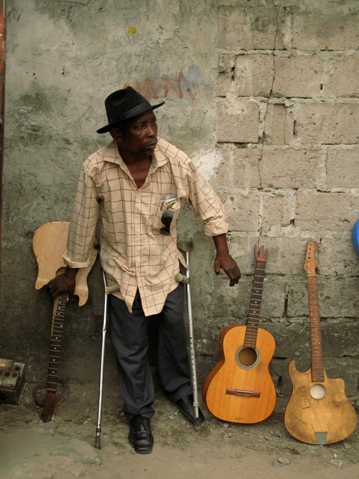 FdlT: Then in May 2009 we were in Paris and we were lucky enough to meet these producers who agreed to become co-producers of the film and who made it possible to finance all the rest of the post-production work. That’s what allowed us to make the film for the cinema, and not just TV. So it was really those guys who saved us.
FdlT: Then in May 2009 we were in Paris and we were lucky enough to meet these producers who agreed to become co-producers of the film and who made it possible to finance all the rest of the post-production work. That’s what allowed us to make the film for the cinema, and not just TV. So it was really those guys who saved us.
RB: Yes, they saved us.
FdlT: There’s always been a certain trust between ourselves and Staff Benda Bilili, which I think is due to Ricky. And Coco. Coco (pictured right) is very discreet in the film and he is discreet by nature. He’s timid but he’s also one of the main composers, and he’s the most observant of them all. Roger is a bit like our son, you know. We housed him. We gave him moral pep talks every now and then, so that he didn’t turn down any dark alleyways.
What’s funny is that last year winning a prize at WOMEX was a great success and all that, but we were in a hole at that time. We didn’t have a hotel room at WOMEX, or anything like that. They would let us sleep in their beds, you know. We’d sleep in the same room. And as they were receiving their per diems they would buy us food. All they wanted was for the film to be released so that it could help us. Because they were on the up and up and they saw us staying down below. After that we didn’t see them for a while because they went back to Kinshasa, or they were on tour, so when we told them that the film would be shown at Cannes in February, it meant nothing, but they sensed that it was important to us and they were really overjoyed, you know. When journalists asked them about the film, they spoke of it as a great triumph.
Afterwards, Ricky hugged us and told us, “All of this is thanks to you,” and we said, “No way, it’s thanks to all of us.” You see, it’s really balanced. I would say that our interests are on the same side. We don’t have any outstanding business issues with them. There’s nothing that could lead to argument between us. We really have a relationship that goes beyond friendship. It’s more like a family, in the sense that we were in the shit, the same shit that they’ve always been in most of their lives, but which we suddenly found ourselves in too, and that in the end we both tasted success together, even if it was a little staggered, but basically together, and so there were great moments of happiness.
- Benda Bilili! opens on Friday 18 March. Read theartsdesk review
- Staff Benda Bilili UK tour: 12 May, The Sage Gateshead; 14 May, Birmingham Town Hall; 15 May, London Roundhouse; 18 May, Norfolk & Norwich Festival; 19 May, Bury St Edmunds Festival; 20 May, Colston Hall, Bristol; 21 May Bridgewater Hall, Manchester - ticket booking via ents24
- Staff Benda Bilili at the Barbican reviewed on theartsdesk
- A much shorter version of this conversation appeared in Songlines Magazine
- Visit Andy Morgan's website
 Find Staff Benda Bilili on Amazon
Find Staff Benda Bilili on Amazon
All images by Florent de la Tullaye, Renaud Barret, Chris McPherson and Gregoire de Laage















Add comment